President Donald Trump tweeted threats to regulate Google search, claiming it is biased against him.
Then his economic adviser revealed that the United States government was looking into regulating Google search.
The search marketing community erupted in spontaneous opposition via social media.
Donald Trump asserted:
Google search results for “Trump News” shows only the viewing/reporting of Fake News Media. In other words, they have it RIGGED, for me & others, so that almost all stories & news is BAD. Fake CNN is prominent. Republican/Conservative & Fair Media is shut out. Illegal?
96% of results on “Trump News” are from National Left-Wing Media, very dangerous. Google & others are suppressing voices of Conservatives and hiding information and news that is good. They are controlling what we can & cannot see. This is a very serious situation-will be addressed!
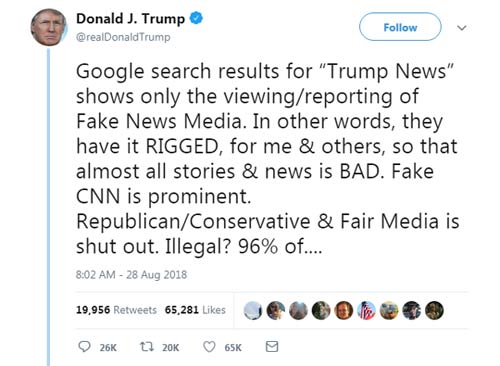
Search Community Pushes Back
Humorous Responses to White House Threats
John Mueller couldn’t resist clicking the like button of a meme tweeted by @LordOfTheSERPs
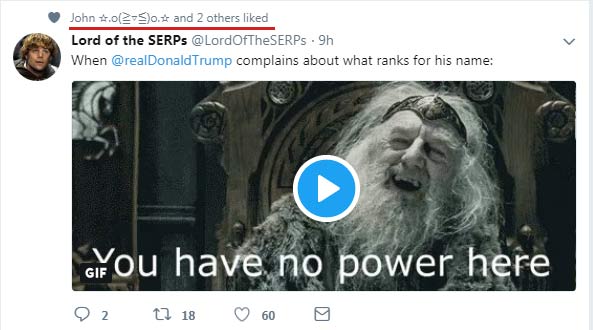 John Mueller liked a tweet that mocked Donald Trump’s threat to regulate Google search results.
John Mueller liked a tweet that mocked Donald Trump’s threat to regulate Google search results.SEO consultant Scott Hendison (@shendison) tweeted a tongue in cheek plea to former Googler Matt Cutts to step in to save the Internet
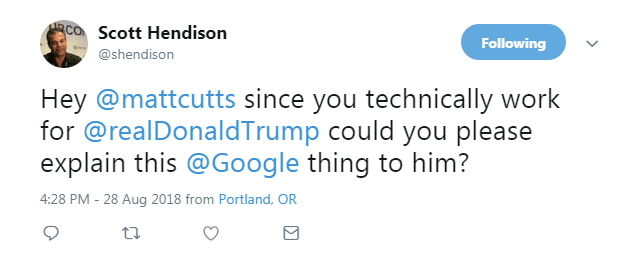
Logical Appeals to Reason
One of the best reactions came from an SEJ contributor and a respected member of the search marketing community – Ryan Jones, (follow him here @RyanJones). His opinion was logical and well thought out.
“I thought the GOP was supposed to be the party of LESS regulation and LESS government.
Also, search engines aren’t biased. They are mirrors – they reflect all the actual content on the internet. If 90% of the news is negative, then search engines aren’t going to show equal parts negative and positive. That wouldn’t be a true representation of what’s on the internet. They’re going to reflect the actual content of the internet and show 90% negative.
This is like blaming the mirror for showing you as fat.”
That’s a fair and balanced assessment. Not political, just the facts.
The Legal Angle Against Regulating Google Search
As usual, search algorithm patent expert Bill Slawski (@bill_slawski ) shared an opinion that was thought provoking and different than any other comment I read elsewhere.
Slawksi suggested that the White House’s move may violate the First Amendment.
He quoted a judgment about Google PageRank where the court found that Google’s ranking algorithm, PageRank, is entitled to first amendment protection. Bill Slawski tweeted the following quote:
“A statement of relative significance, as represented by the Page Rank, is inherently subjective in nature. Accordingly, the Court concludes that Google’s Page Ranks are entitled to First Amendment protection.”
Then Bill Slawski tweeted a part of the First Amendment:
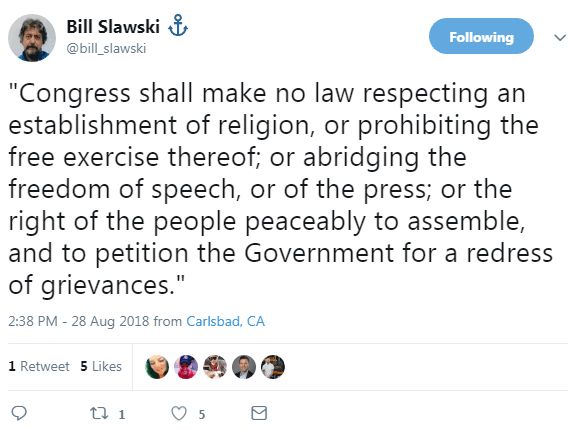
SEO Lessons to Donald Trump
Some in the SEO community responded by taking Donald Trump to SEO School.
Ian Lurie of Portent Interactive (@portentint) tweeted a response showing that the source of Trump’s problems is self-inflicted and not the fault of Google.
“Actually, your content sucks. This is what happens when you slash the size of the White House site and leave conservative sites with nothing but conspiracy dross and scandals. Learn how search engines work and you’ll understand why you’re getting thumped in the rankings.
For example, your claim that search engines are rigged against you now dominates the rankings.”
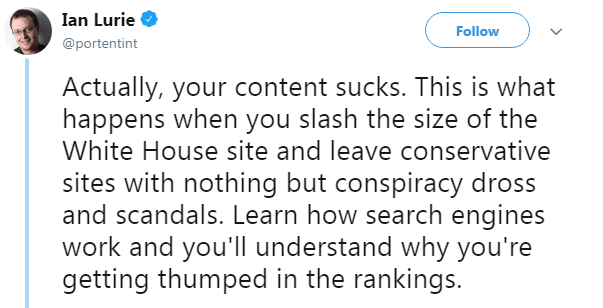
SEO consultant John Carcutt (@JohnCarcutt) responded with a thoughtful essay that similarly noted that Google is mirroring reality. Here’s a portion of what he published:
“Google’s job is to ‘find’ the best answer to a question. They do this by crawling as much of the web as they can (most of it) and then apply their algorithms to sort out which page on the Internet has the “Best” answers to the question asked, then sort them appropriately and display them in the search results.
…if you are a business or a President and a ton of information is being published about you on the internet and 53% of people dislike you and only 42% like you, it is much more likely that negative information is being written.
Since the algorithms do not use ‘sentiment’ the odds are much more likely that the negative information will prevail in the search results. This along with the known concept that people are much more likely to speak up about something they ‘don’t’ like vs. something they ‘do’ like. This goes for creating content too.”
Can Algorithms be Biased?
Yes, algorithms can be biased, including racially biased.
A ProPublica article detailed how an algorithm created to assess the likelihood of someone committing another crime was was racially biased. The algorithm actually scored poorly in predicting the likelihood of someone committing another crime.
It was reported in February that facial recognition software had a 35 percent success rate for women with darker skin and a 99 percent success rate for white men.
Is Google Biased?
The EU fined Google 2.4 billion Euros for being biased against competitors in favor of it’s own products and services. According to an article in The Guardian, an EU official stated:
“Google abused its market dominance as a search engine by promoting its own comparison shopping service in its search results, and demoting those of competitors.
What Google has done is illegal under EU antitrust rules. It denied other companies the chance to compete on the merits and to innovate.”
Google’s algorithm is protected as free speech precisely because it is an opinion.
Google’s algorithm represents its opinion of what satisfies the most users.
That’s why on occasion Google has been embarrassed by anti-Semitic search results.
Is Google Biased Against Donald Trump?
The question here is if Google is politically biased.
The search community apparently feels that Google is not politically biased.
The SEO Community Pushes Back
There has long been a fringe group of disgruntled SEO practitioners who have advocated for Google to be regulated.
Some reason that Google favors brands over small businesses and should therefore be forced to give more sites a chance.
But those are fringe opinions, typically expressed by publishers who are bitter about being banned by Google at one time in their past.
The search community has consistently been united against the regulation of Google search results.
Which may explain the vigorous push back by the SEO community against White House threats of regulation of the search industry.

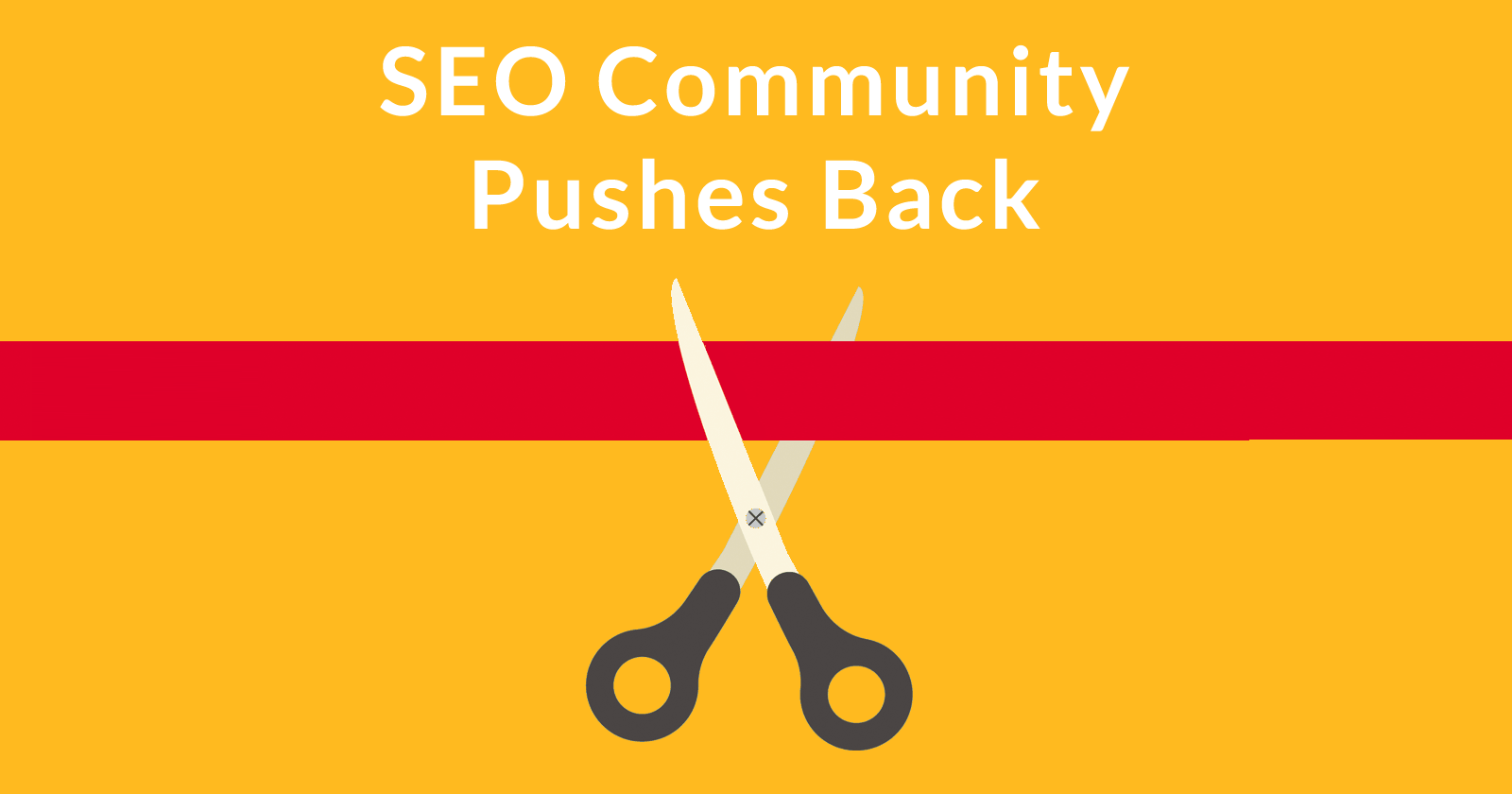



![AI Overviews: We Reverse-Engineered Them So You Don't Have To [+ What You Need To Do Next]](https://www.searchenginejournal.com/wp-content/uploads/2025/04/sidebar1x-455.png)